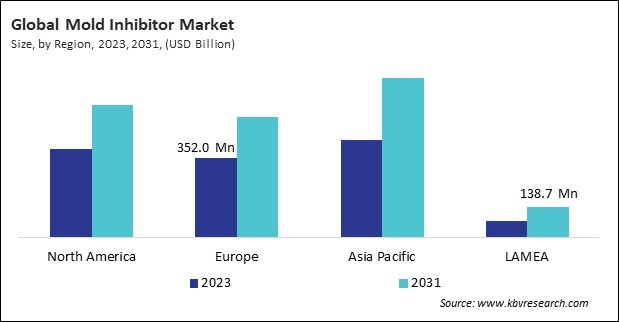According to a new report, published by KBV research, The Global Mold Inhibitor Market size is expected to reach $2 billion by 2031, rising at a market growth of 6.0% CAGR during the forecast period.
The mold inhibitor market encompasses a wide array of products designed to prevent or slow down mold growth on various surfaces and materials. These inhibitors are crucial in multiple industries where mold growth can lead to significant product spoilage, health hazards, and structural damage. The market is driven by the need to maintain product quality, extend shelf life, comply with stringent regulations, and cater to increasingly health-conscious and environmentally aware consumers.

The Benzoates segment led the Global Mold Inhibitor Market by Type in 202; thereby, achieving a market value of $483.8 million by 2031. Benzoates, particularly sodium benzoate and potassium benzoate, are highly effective in inhibiting the growth of mold and yeast in various food and beverage products. They disrupt the metabolic processes of molds, preventing their proliferation and extending the shelf life of perishable goods such as baked goods, dairy products, and beverages.
The Pharmaceuticals segment is growing at a CAGR of 4.8 % during the forecast period. Pharmaceutical products are susceptible to microbial contamination, including mold growth, which can compromise their safety, efficacy, and stability. Mold inhibitors are essential for maintaining the integrity of pharmaceutical formulations and extending their shelf life by inhibiting microbial spoilage.
Full Report: https://www.kbvresearch.com/mold-inhibitor-market/
The Asia Pacific region dominated the Global Mold Inhibitor Market by Region in 2023, and would continue to be a dominant market till 2031; thereby, achieving a market value of $708.9 million by 2031. The North America region is anticipated to grow at a CAGR of 5.4% during (2024 - 2031). Additionally, The Europe region would witness a CAGR of 5.6% during (2024 - 2031).
By Type
By Application
By Geography
 Unique Offerings
Unique Offerings